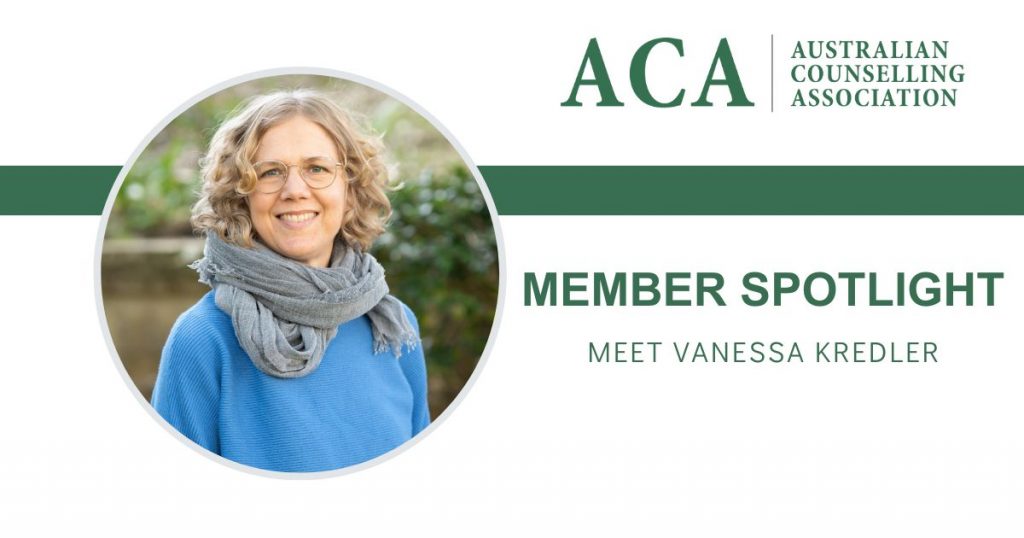Member Spotlight: Vanessa Kredler
Each month we spotlight an ACA member in the ACA Monthly Bulletin, our monthly newsletter. The Member Spotlight is designed to showcase the work of our members to you! We hope their stories inspire or spark interest. Let’s share our experiences within our counselling community.
Vanessa Kredler | Counsellor, Psychotherapist.

What motivated you to pursue a career in counselling?
I have lived experience of addiction and trauma that motivated me to learn about all things healing and eventually led to supporting others. As soon as I started my personal recovery journey I started training as a counsellor in parallel because I knew there was something important about this work.
What specific areas do you primarily work within?
Most of my clients struggle with food addiction, disordered eating, and/or complex trauma. I work on zoom with clients from all over Australia and at various points on their recovery journeys. Sessions can vary greatly because with some clients I work at a very practical level as addiction recovery requires developing new knowledge, skills and ways of coping. With other clients we work at a much deeper level on healing underlying wounds, mainly through Internal Family Systems (IFS) therapy, which is very powerful. And often we work in parallel on practical and deeper aspects.
What is a recent personal success or achievement you’re proud of?
I have recently given a couple of presentations about food addiction to colleagues from the eating disorders field. This is very positive and encouraging because food addiction is not officially recognised in the DSM and ICD despite so many clients identifying with it. In the eating disorders field, food addiction is sometimes seen as a dangerous concept because it advocates for abstaining from certain food and food behaviours (for some clients), which can exacerbate dietary restraint in some people with eating disorders. On the other hand, the approach of moderating all foods advocated in the eating disorders field can be very harmful to some food addiction clients. It’s important that we have open discussion about how clinical presentations overlap and how we can best support clients without falling into warring camps. Dialogue and collaboration are very important so that we can improve our care, especially around food and eating which is a complex topic for everyone, even for people without addiction or disordered eating.
What is the most rewarding aspect of being a counsellor for you?
What is most rewarding is when clients feel heard and understood by me no matter what is going on for them. Particularly, when clients’ experience of food addiction is validated, as the concept is often not taken seriously by professionals or misdiagnosed. I also enjoy being able to be what in IFS we call a ‘hope merchant’, bringing hope that healing is possible.
How do you contribute to the betterment of the profession and your community?
Part of me says that I contribute to the betterment of the profession and the community by holding advocacy positions. For example, I am a SANE Australia peer ambassador and a member of the Blue Knot Foundation Lived and Living Experience Committee to co-design their trauma-informed services. I use my lived experience to help reduce stigma and improve services. Another part of says, it’s more about just aspiring to be authentic, integral, and humble in all areas of life, to the best of my ability.
Are there any particular projects or initiatives you’re currently involved in?
I’m involved with my food addiction colleagues overseas to raise awareness around the currently unrecognised concept of food addiction, and am supporting people on Dr Vera Tarman’s Sugar Free for Life Facebook group.
I also run regular Internal Family Systems (IFS) and food addiction groups to support clients who want to explore IFS in relation to food and eating and am immensely enjoying those groups.
What advice would you give to someone considering a career in counselling?
Don’t be afraid to use your lived and living experience as a motivator to enter the field but be aware of your own biases and do your own healing work so that you can keep it out of the work with your clients.
Is there a quote or philosophy that inspires your work?
Do your own work. I don’t know who said it, but it basically signifies to me that we can only take our clients as far and deep as we’ve gone ourselves and that we have a responsibility to look after our own healing in order to support others.



